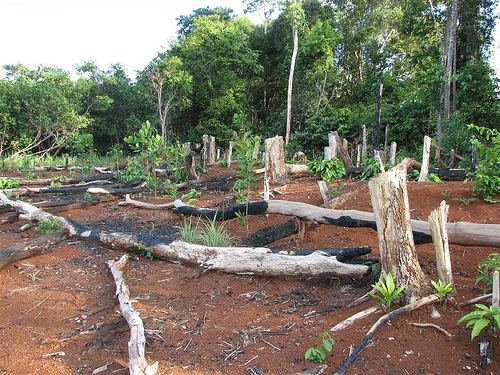IFAD Calls for Urgent Investments to Combat Land Degradation and Ensure Global Food Security at COP16
With land degradation accelerating worldwide, IFAD urges targeted investments to restore soil health, empower small-scale farmers, and safeguard ecosystems.

As the sixteenth Conference of the Parties (COP16) of the United Nations Convention to Combat Desertification (UNCCD) begins today in Riyadh, Saudi Arabia, the International Fund for Agricultural Development (IFAD) has called for urgent investments to combat land degradation and desertification, which threaten global food security, climate stability, and biodiversity.
Land degradation is advancing at a startling pace, affecting up to 40% of the world’s land, and impacting approximately half of the global population. This ongoing environmental crisis has significant implications for agriculture, as healthy, fertile soil forms the backbone of sustainable farming and food security.
According to Alvaro Lario, the President of IFAD, land degradation is a crisis that demands immediate action. "The planet loses fertile land equivalent to the size of Uganda every single year,” he stated. “We need to urgently invest to reverse this decline and restore millions of hectares to protect our climate, biodiversity, and food supplies.”
The Role of Small-Scale Farmers
Small-scale farmers, who contribute one-third of the world’s food supply, are especially vulnerable to the impacts of land degradation. These farmers are critical to global food security, particularly in developing countries where they also drive local economies and provide livelihoods for millions of people. Unfortunately, these farmers are often on the frontline of environmental challenges such as desertification, drought, and soil infertility.
Restoring the land, supporting these farmers, and enhancing soil health can yield substantial benefits. Every US$1 invested in land restoration can generate up to US$30 in economic returns, according to IFAD estimates. Moreover, enhancing soil health could offset 5-20% of global emissions while simultaneously boosting food security across the globe.
The Financing Gap
Despite the high returns on investment in sustainable land management, global financing for rural areas and small-scale farmers remains insufficient. Small-scale farmers currently receive less than 1% of global climate finance, amounting to only US$5 billion per year. IFAD has estimated the financing gap at US$75 billion annually, highlighting the urgent need for greater and more targeted funding.
“We not only need more funding for food systems but also smarter funding,” said Lario. “It is only by mobilizing private sector finance that we can build more resilient and sustainable agri-food systems. Nature is a common good, and investing in its long-term viability delivers returns, both economic and societal.”
The Urgency of Addressing Land Degradation
Land degradation and desertification not only endanger food security but also exacerbate poverty, increase migration, and escalate social instability. It is estimated that 1.5 billion people are directly affected by desertification and drought. Furthermore, the loss of up to 5% of GDP due to land degradation is correlated with a 12% increase in the likelihood of violent conflict.
COP16 in Riyadh aims to tackle these urgent issues, as participants come together to mobilize funding and investments to restore degraded land and enhance drought resilience for people and ecosystems worldwide.
IFAD’s Commitment to Climate Action
Recognizing the critical link between climate change and land degradation, IFAD has committed to significantly increasing its investment in climate action. From 2022 to 2024, IFAD has raised its spending on nature-based solutions and restoration to 40% of its Programme of Loans and Grants (PoLG), up from 25% in the previous cycle. This share is expected to grow further, reaching 45% from 2025 to 2027.
In 2024 alone, IFAD invested over US$750 million in projects supporting small-scale farmers to build resilience against a changing climate. This is a significant increase from US$502.7 million spent in 2022-2023.
Over its last two project cycles, IFAD has committed to agroecological practices—approaches that promote sustainable agriculture while preserving natural resources. Between 2015 and 2021, IFAD-supported projects helped halt desertification and reclaim more than 1 million hectares of land.
Partnerships and Initiatives for Climate Adaptation
In 2024, IFAD joined the Vision for Adapted Crops and Soils (VACS) movement, further boosting its efforts to increase climate adaptation funding and empower small-scale farmers. VACS works by restoring soil health, promoting climate-resilient crops, and using participatory approaches to decision-making, directly addressing the needs of farmers facing the brunt of climate change impacts.
A Global Call for Action
At COP16, IFAD will highlight the dire consequences of inadequate investment in food security and land restoration. The organization will call on both government and private sector leaders to take immediate action to reverse land degradation and support the sustainable development of agriculture.
The stakes are high: desertification, climate change, and poor land management threaten the livelihoods of millions and the stability of regions worldwide. But through collaboration, investment, and innovation, IFAD believes it is possible to restore soil health, empower farmers, and safeguard the future of food security for the planet.
COP16 will run from 2-13 December 2024, and is expected to be the largest UN land conference to date, focusing on mobilizing resources and fostering international cooperation to combat desertification and land degradation.










